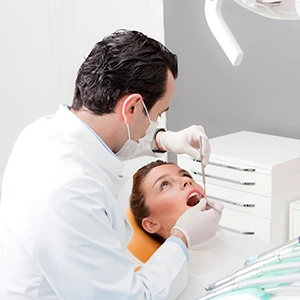
Patient Info
Dental Implants
Cosmetic Dentistry
General Dentistry
Tooth extractions are quite common among adults, and the prospect of undergoing one can be daunting. When your dentist informs you that a tooth extraction is necessary, it's natural to feel anxious and apprehensive. However, this information also presents an opportunity for you to seek clarity by asking questions about the procedure, aftercare, and recovery process. Gathering all the necessary information beforehand can help alleviate your concerns and prepare you for the upcoming appointment. The most common question about tooth extractions is: How long after a tooth extraction can I eat?
You must be wondering, How long after a tooth extraction can I eat? You can resume eating a few hours after your tooth extraction surgery. However, it's important to wait until the numbing medication wears off, which typically takes a few hours. Once the numbness subsides, you can begin consuming the recommended foods.
The following food can be eaten after tooth extraction.
During the initial 24 hours following tooth extraction surgery, it's best to avoid solid foods that require chewing. Instead, stick to liquids such as milkshakes, applesauce, and smoothies. However, if you prefer solid foods, opt for soft options like pudding and porridge.
It's crucial to avoid using a straw for drinking during this time. While convenient, the suction created by a straw can remove the blood clot in the extraction site, leading to pain, bleeding, and delayed healing.
You can start introducing soft foods into your diet that require minimal chewing. Be careful not to chew near the extraction site to avoid any discomfort or disruption. It's crucial to avoid consuming extremely hot or cold foods during the initial days following the tooth extraction. Hot foods can stimulate blood flow to the extraction site, potentially dislodging the blood clot.
While sticking to a liquid diet is recommended, it's important to refrain from consuming alcohol for at least 48 hours after the surgery, as it can interact with medications and impede the healing process. Additionally, it's advisable to steer clear of smoking, as the chemicals in tobacco can hinder the healing process and prolong recovery.
Refrain from chewing near the extraction site to ensure a smooth recovery. However, you can gradually return to your regular diet after 72 hours. Avoid hot, sticky, spicy, acidic, and crunchy foods until your gum tissue and jawbone have fully healed to prevent any complications.

Dentists recommend tooth extractions to eliminate infections or diseases from your mouth, promoting overall oral health. During surgical tooth extraction, the mouth remains moist, creating an environment conducive to bacterial growth. With over 600 species of bacteria present in the mouth, a wet wound becomes susceptible to complications if not managed carefully.
Food restrictions may seem like a minor inconvenience, but they are crucial for ensuring smooth healing after extraction. Adhering to these restrictions is vital to prevent potential complications and promote optimal recovery. Ignoring the dentist's instructions may prolong the healing process and result in additional visits for treatment.
While abstaining from certain foods temporarily may be inconvenient, it is a small sacrifice compared to the benefits of resolving dental issues and achieving a healthy mouth.
Still thinking, "How long after a tooth extraction can I eat?" The timeline for resuming eating after a tooth extraction varies for each individual, depending on factors like healing speed and personal comfort. It's crucial to adhere closely to your dentist's post-extraction instructions to ensure a successful and comfortable recovery. Beginning with soft foods and gradually transitioning to harder ones as you heal will promote optimal recovery and minimize discomfort.
Ready to discuss your dental needs or have questions about tooth extraction recovery? Book an appointment online with Springhill Dental Health Center, Mobile, AL, or call us at (251) 265-7808 for new patients and (251) 343-1521 for all other callers.
You can start eating soft foods after 24 hours, gradually progressing to solid foods as tolerated.
It's best to avoid using straws for the first few days after extraction to prevent dislodging the blood clot.
Some discomfort is normal, but it should gradually improve within a few days. If the pain remains or worsens, consult your dentist.
My visit was incredible. I had my “All on Four” appliances cleaned, and it was a painless and thorough experience. Dr. Scott and all his staff are very friendly. During the cleaning, Mary was gentle and let me know everything she was doing and how it would feel. She gave me tips on how to clean my implants/appliances better and gave me a small brush to do the underside more effectively. Dr. Scott and Mary suggest cleanings take place every 3 months so I will be back in December.

Dr. Byron Scott is a highly-trained and accomplished dentist. He attended The University of Alabama School of Dentistry and subsequently completed numerous Advanced Studies and Trainings. Dr. Scott is Board-Certified by The Academy of General Dentistry and has earned Mastership status (MAGD), an honor shared by only 1% of dentists. He has numerous memberships and associations, including Diplomate status with The American Board of Oral Implantology (D-ABOI) and The International Congress of Oral Implantologists (D-ICOI). Overall, Dr. Scott has dedicated his life and career to helping patients improve their oral health through expert dentistry. His goal is to help each patient keep their smile healthy, attractive, and comfortable for the duration of their lifetime.
